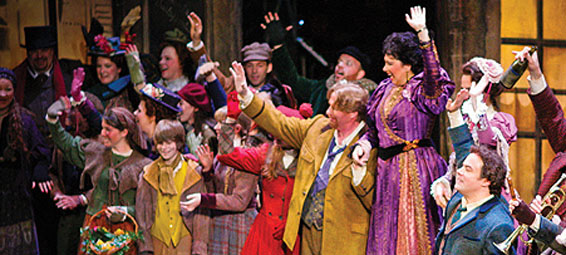Puccini’s old reliable La Boheme is much more than just a tear-jerking musical tragedy, as demonstrated by the wonderfully fresh performance that opened the Fort Worth Opera’s spring festival at Bass Performance Hall Saturday night.
Much of the credit goes to director David Lefkowich’s magnificent staging and insistence on a natural, humanized movement among the singers. Rodolfo, Mimi, Musetta, Marcello, and their companions are among the most realistic of all opera characters, and they came alive in this production even more believably than usual. Subtle highlighting of details in the words and the music constantly enlivened the performance, all with the ultimate purpose of reminding the viewer of the joys and dangers of living exuberantly. (The surprising interaction of Musetta and Marcello at the end of Act III, though not authorized in the score, fit perfectly with the trajectory of their relationship and the opera as a whole.)
The cast, featuring Sean Panikkar as Rodolfo, Wes Mason as Marcello, Mary Dunleavy as Mimi, and Rosa Betancourt as Musetta, was equally commendable. Dunleavy’s voice was a little dark for the shy seamstress in Act I, but quickly warmed up to heavenly perfection. All of these singers clearly understand that, in Boheme, one becomes a star by submerging in the ensemble.
R. Keith Brumley’s sets, originally designed for Lyric Opera of Kansas City, neatly telescoped and compartmentalized the action, convincingly solving the challenge of presenting an impoverished garret on a big stage. Although conductor Joe Illick did not always hold the orchestra together concisely, the performance clipped forward nicely.
Less than twenty-four hours later, the second of the festival’s four productions took the stage at McDavid Studio in the Bass Hall complex with the regional premiere of a Tom Cipullo’s powerful Glory Denied of 2006. The biography of an American POW may seem an unlikely subject matter for an opera, but Cipullo impressively encapsulated the tragic epic—both before and after imprisonment—of Jim Thompson, whose nine-year ordeal in North Vietnam, the longest ever endured by an American POW, was documented in a book by Tom Philpott in 2001.
Focusing on the rapid decay of Thompson’s marriage after his release from prison in North Vietnam, Cipullo interweaves the personal horrors Thompson experienced with the epic social changes at play during that era as well as the dilemma of two human beings—Thompson and his wife Alyce—swept up, unprepared and against their will, in the wind of history. Clearing away the hundreds of voices who speak in Philpott’s documentary biography, Cipullo creates a quartet made up of Thompson and his wife Alyce, portraying each of those two real human beings at different stages in their lives. Without departing from a lean, modernist texture, Cipullo manages to introduce several magnificent arias good enough to stand alone in a concert or recital, most notably the older Alyce’s poignant “After You Hear Me Out,” and the older Jim’s “Everything Has Changed Somehow,” a bitter, rapid-paced catalogue of how the world changed during Thompson’s captivity.
The singers—tenor David Blalock as the younger Thompson, baritone Michael Mayes as the older Thompson, soprano Sydney Mancasola as the younger Alyce, and soprano Caroline Worra as the older Alyce—met the considerable musical and dramatic challenges impressively, with soprano Worra emerging as the first among equals in a role that demands a special blend of vulnerability and defiance. Conductor Tyson Deaton skillfully guided the quartet and the small chamber orchestra through this unfailingly energetic, often lyrical score.
Stephen Chudej’s costumes from the time in question were outwardly simple but obviously rich with meaning and symbolism. Richard Kagey’s equally concise sets provided a perfect platform for the destruction of Thompson’s soul, with the neat, symmetrical arrangement of trunks, chairs, and a table gradually becoming strewn with the trash and litter of a ruined life. Stage director Dean Anthony succeeded in bringing a visual realization—often with striking synchronized and mirrored motion among the singers—to the rich verbal and musical interaction of Cipullo’s intimate operatic masterpiece.





